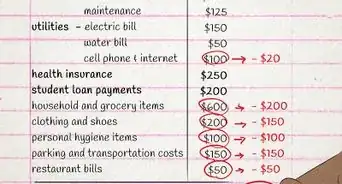This article was co-authored by Moshe Ratson, MFT, PCC. Moshe Ratson is the Executive Director of spiral2grow Marriage & Family Therapy, a coaching and therapy clinic in New York City. Moshe is an International Coach Federation accredited Professional Certified Coach (PCC). He received his MS in Marriage and Family Therapy from Iona College. Moshe is a clinical member of the American Association of Marriage and Family Therapy (AAMFT), and a member of the International Coach Federation (ICF).
There are 8 references cited in this article, which can be found at the bottom of the page.
This article has been viewed 20,538 times.
Dealing with a selfish husband can be a frustrating and lonely experience. It’s important to remember that it’s not your fault if your husband is acting in a selfish manner. He might simply be working through some things that are affecting his behavior. Luckily, there are ways to encourage more selfless behavior in your husband, such as thanking him when he helps you, complimenting him on positive traits, and showing empathy for him. Adopting effective communication habits, such as asking open-ended questions and being a good listener, can also help you deal with a selfish husband. There are also some simple tricks that may help to promote a closer bond overall.
Steps
Communicating with a Seflish Husband
-
1Ask open-ended questions to demonstrate selfless communication. Open-ended questions are those that do not result in a yes or no answer. Instead, they encourage the person you’re speaking with to give a more in-depth answer. Practice asking your husband open-ended questions to let him know that his thoughts and opinions matter to you.[1]
- For example, instead of asking, “Should I make pork or chicken for dinner tonight?” you might ask, “What would you like for dinner tonight?”
- Instead of asking, “Did you have a good day at work?” say something like, “How was your day?”
-
2Use “I” statements to express what you need from your husband. An “I” statement is simply a sentence that begins with “I” and focuses on your perspective rather than casting blame on the other person. Phrasing your needs this way will help to reduce the chances that he will become defensive, even when you are expressing hurt feelings over something he did or said. This means that you can identify the action that hurt your feelings in a less confrontational way.[2]
- For example, if your husband came home much later than he said he would and did not call or text, you might say something like, “I was very worried about you when you didn’t come home at your usual time. Please call or text next time that happens.”
- Or, if your husband pressures you to have sex when you’re not in the mood, you might say something like, “I feel uncomfortable when you pressure me to have sex. I’d rather we only had sex when we’re both in the mood.”
Advertisement -
3Practice active listening skills when talking with your husband.[3] Give him your full attention and interest when he’s talking to model good listening skills for him. Put away your cell phone and turn off devices like the TV or a laptop so that you won’t be distracted. Face him and make eye contact with him. Nod and make neutral statements as well to show that you’re paying attention.[4]
- For example, you can say “yes,” “go on,” “I see,” and “uh-huh” to show you’re paying attention.
- Also, make sure to ask for clarification if anything he says is unclear. For example, you might say something like, “What did you mean when you said you were ‘lost and confused’?”
-
4Take a break from the situation if you get frustrated.[5] Any time your husband’s selfishness starts to get to you, give yourself permission to take a break. Even if you can only get away for a few minutes, it may help you to calm down and resume talking with him without saying something you might regret. Try excusing yourself to go to the bathroom or taking a quick walk around the neighborhood.[6]
- To excuse yourself, you might say something like, “I’ll be right back. I just need to go to the restroom.” Or, you could say something like, “I could really use some fresh air, so I’m going to take a quick walk around the block and then I’ll be right back.”
Tip: Try taking a few deep breaths during your break. Breathe in to the count of 4, hold the breath for 4 seconds, and then exhale to the count of 4. Repeat this as many times as you need to feel relaxed.
Encouraging Selfless Behavior
-
1Model selfless behavior for your husband. While you cannot change your husband or the way he acts, you can model the type of behavior you’d like him to adopt. By behaving towards him in a selfless manner, he may be encouraged to return the favor. Look for little ways that you can be selfless in your interactions with your husband, such as:[7]
- Asking him about his day after he gets home from work.
- Preparing a cup of coffee for him how he likes it and bringing it to him.
- Offering to rub his shoulders if he complains of feeling stressed.
-
2Avoid responding to his selfish behavior with anger or frustration. If your husband does or says something selfish, you may want to immediately rebuke or scold him. This opens the door for an argument, which may make the situation worse. If he does something that angers you, take a few deep breaths before responding in a calm way. [8]
- For example, if he plops down on the couch after dinner while you’re trying to clean up and you need his help, you might say something like, “Honey, I know you’ve had a long day, but would you mind clearing the table for me while I tidy up the kitchen? It will only take a few minutes but it would help me so much!”
-
3Be empathetic towards your husband to better understand his mindset. Showing empathy is when you put yourself in another person’s situation and try to see things from their perspective. You can do this by imagining what your husband might be feeling or considering why he might be acting the way that he is. Practice showing empathy for your husband often to see his side of things.[9]
- To show that you’re concerned about your husband’s feelings, you might say something like, “You’re so quiet tonight. What’s on your mind?” or “I’m glad to see you smiling. Good day?” or “You seem a little sad tonight. Would you like to talk about it?”
- By communicating with your husband in this way on a regular basis, he may start to notice your emotions as well and get curious about what you’re thinking or feeling.
-
4Acknowledge when he does something selfless. Positive reinforcement may help to encourage your husband to change his behavior. Avoid responding to his selfish behavior with anger or frustration. This may be hard to do sometimes, but take a few deep breaths before you say anything and then respond in a more positive manner, such as by saying “thank you” and identifying why you’re thanking him.[10]
- For example, if your husband loads the dishwasher after dinner, you might say something like, “Thank you so much for loading the dishwasher! I was so tired after dinner, so I really appreciate that you did that.”
- If you husband takes your car for an oil change, you might say something like, “Thanks for getting the oil changed in my car! I wasn’t sure how I’d fit that into my schedule this week. You’re the best!”
Tip: Try keeping a running list of everything your husband does to help you each day. Even if it seems small, make a note of it so you’ll remember to thank him for it.
-
5Compliment him on his appearance, accomplishments, and traits. Compliments are another great way to show your husband that you appreciate him, and this may prompt him to start noticing your contributions more, too.[11] Look for something to compliment your husband on every day, even if it’s something seemingly insignificant. For example, you might compliment your husband on:[12]
- An aspect of his appearance, such as a new haircut. Try saying, “I love your new haircut! It really brings out your eyes. You’re so handsome!”
- Something he accomplished at work, such as completing a big project. Try saying, “Wow! It sounds like you did an amazing job on that project at work! Your boss must be so pleased with you. Way to go, honey!”
- His admirable qualities, such as being a good friend. Try saying something like, “You were so kind and supportive yesterday when Joey called about his father passing away. I really admire that.”
Finding New Ways to Connect with Your Husband
-
1Spend some quality time with your husband every day. Even if you’re short on time, try to fit in at least 20 minutes of quality time. Sit down to breakfast together before you both head off to work, meet up for a midday lunch date, or simply cuddle up in bed together a little earlier than usual. Do this every day to build your connection with your husband.[13]
- Even if you only have 10 minutes, use it in a way that’s enjoyable for both of you. Have a quickie lovemaking or makeout session if nothing else!
-
2Do physical activities that encourage teamwork with your husband. Exercising together is a great way to foster a sense that you and your husband are on the same tea. Simple activities like walking in the same direction can help you both to feel as if you’re on the same team, which may help to reduce selfish behavior. Try going on a daily walk together or doing another form of exercise together, such as running, biking, or dancing.[14]
- As an added bonus, exercise releases endorphins, which are your body’s feel-good hormones. This may help to put your husband in a good mood and inspire him to act in a more selfless manner.
Tip: If you’re both into the same sport, you might even look into a local inter-mural league you could get involved with, such as a co-ed beach volleyball team or running club.
-
3Sit side-by-side instead of across from each other when you go on dates. Positioning yourself in this way promotes team mentality whereas sitting across from one another is more formal, like a boss-employee arrangement. When you and your husband go out to dinner, try sitting next to him instead of facing him.[15]
- For example, you could request a booth in a restaurant and sidle up next to him on the seat, move 2 chairs together on one side of a table, or sit side-by-side at the restaurant bar for a more casual dining experience.
-
4Hug more often to increase your physical intimacy. Getting more frequent hugs from your partner may help to increase your oxytocin levels, which is the hormone that promotes bonding. If you and your partner don’t hug much, this can be a simple, yet effective, way to improve your relationship. Try initiating more hugs throughout the day.[16]
- For example, you could hug your partner after you both wake up in the morning, when you see each other after work, or before bed each night.
- Kissing, holding hands, and snuggling are also good ways to promote more physical intimacy, so look for ways that you can work these behaviors into daily interactions with your husband.[17]
-
5Have a drink with your husband to unwind. There is some evidence that drinking the same amount as your spouse can help to promote a better relationship with them. This does not mean that you should take up heavy drinking if your spouse is a heavy drinker or that you should start drinking if you don’t drink at all. However, you may notice a slight improvement in your relationship if you drink together. If you both enjoy the occasional drink, try to have it at the same time.[18]
- For example, go for a drink together during happy hour or share a bottle of wine with your husband on the weekend.
-
6Watch a romantic comedy together and discuss it. Romantic comedies often depict relationship issues, which may include a selfish partner or spouse. Watching a romantic comedy with your husband and then talking about it afterward may help to promote better problem-solving skills in your relationship. Your spouse may even learn something from observing a rom-com star’s mistakes, and this might benefit your relationship in the long run.[19]
- Look up romantic comedies on a video streaming service and pick one that interests both of you. Try asking your husband for his input, such as by saying, “Which of these movies sounds good to you?”
- If rom-coms aren’t your thing, watch something in a genre you both enjoy and discuss it afterward. If possible work something into the discussion about the relationships in the film, such as by saying, “I was so frustrated by the way the main character treated his girlfriend. He was kind of a jerk, even though he got better towards the end. What did you think about that?”
Expert Q&A
-
QuestionHow can I handle a selfish partner?
 Moshe Ratson, MFT, PCCMoshe Ratson is the Executive Director of spiral2grow Marriage & Family Therapy, a coaching and therapy clinic in New York City. Moshe is an International Coach Federation accredited Professional Certified Coach (PCC). He received his MS in Marriage and Family Therapy from Iona College. Moshe is a clinical member of the American Association of Marriage and Family Therapy (AAMFT), and a member of the International Coach Federation (ICF).
Moshe Ratson, MFT, PCCMoshe Ratson is the Executive Director of spiral2grow Marriage & Family Therapy, a coaching and therapy clinic in New York City. Moshe is an International Coach Federation accredited Professional Certified Coach (PCC). He received his MS in Marriage and Family Therapy from Iona College. Moshe is a clinical member of the American Association of Marriage and Family Therapy (AAMFT), and a member of the International Coach Federation (ICF).
Marriage & Family Therapist It can help to talk honestly with them about how their behavior makes you feel. You can also try to set some time aside for them for date nights and building your relationship.
It can help to talk honestly with them about how their behavior makes you feel. You can also try to set some time aside for them for date nights and building your relationship. -
QuestionHow can I improve intimacy with my partner?
 Moshe Ratson, MFT, PCCMoshe Ratson is the Executive Director of spiral2grow Marriage & Family Therapy, a coaching and therapy clinic in New York City. Moshe is an International Coach Federation accredited Professional Certified Coach (PCC). He received his MS in Marriage and Family Therapy from Iona College. Moshe is a clinical member of the American Association of Marriage and Family Therapy (AAMFT), and a member of the International Coach Federation (ICF).
Moshe Ratson, MFT, PCCMoshe Ratson is the Executive Director of spiral2grow Marriage & Family Therapy, a coaching and therapy clinic in New York City. Moshe is an International Coach Federation accredited Professional Certified Coach (PCC). He received his MS in Marriage and Family Therapy from Iona College. Moshe is a clinical member of the American Association of Marriage and Family Therapy (AAMFT), and a member of the International Coach Federation (ICF).
Marriage & Family Therapist Touch each others more. You might hug, kiss, hold hands, and snuggle. Incorporate these moments of intimacy into your day. Additionally, talk to each other more to grow closer emotionally.
Touch each others more. You might hug, kiss, hold hands, and snuggle. Incorporate these moments of intimacy into your day. Additionally, talk to each other more to grow closer emotionally.
References
- ↑ https://www.gottman.com/blog/self-interest-not-selfish-relationships/
- ↑ https://www.helpguide.org/articles/relationships-communication/effective-communication.htm
- ↑ Moshe Ratson, MFT, PCC. Marriage & Family Therapist. Expert Interview. 7 August 2019.
- ↑ https://www.helpguide.org/articles/relationships-communication/effective-communication.htm
- ↑ Moshe Ratson, MFT, PCC. Marriage & Family Therapist. Expert Interview. 7 August 2019.
- ↑ https://www.helpguide.org/articles/relationships-communication/effective-communication.htm
- ↑ https://www.thebridalbox.com/articles/how-to-deal-with-selfish-husband_0053275/
- ↑ https://www.thebridalbox.com/articles/how-to-deal-with-selfish-husband_0053275/
- ↑ https://www.gottman.com/blog/self-interest-not-selfish-relationships/
- ↑ https://www.thebridalbox.com/articles/how-to-deal-with-selfish-husband_0053275/
- ↑ Moshe Ratson, MFT, PCC. Marriage & Family Therapist. Expert Interview. 7 August 2019.
- ↑ https://www.thebridalbox.com/articles/how-to-deal-with-selfish-husband_0053275/
- ↑ https://www.womansday.com/relationships/dating-marriage/advice/a7323/how-to-improve-your-marriage/
- ↑ https://www.womansday.com/relationships/dating-marriage/advice/a7323/how-to-improve-your-marriage/
- ↑ https://www.womansday.com/relationships/dating-marriage/advice/a7323/how-to-improve-your-marriage/
- ↑ https://www.ncbi.nlm.nih.gov/pubmed/15740822
- ↑ Moshe Ratson, MFT, PCC. Marriage & Family Therapist. Expert Interview. 7 August 2019.
- ↑ https://www.eurekalert.org/pub_releases/2013-11/uab-hdi112113.php
- ↑ https://www.eurekalert.org/pub_releases/2014-01/uor-drc013114.php










































































